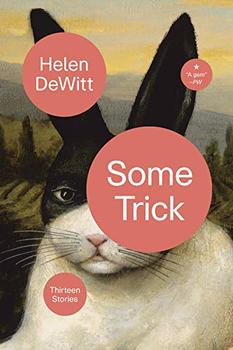Summary | Excerpt | Reviews | Beyond the Book | Readalikes | Genres & Themes | Author Bio

Critics' Opinion:
Readers' Opinion:
First Published:
May 2018, 224 pages
Paperback:
Oct 2019, 208 pages
 Book Reviewed by:
Book Reviewed by:
Lisa Butts
Buy This Book
As-tu déjeuné, Jacquo?
The figure hurtled back -
Eh de quoi?
& back again, on a cascade of notes of inexpressible pathos:
Ah! Ah! Ah! Ah! Ah!
As-tu déjeuné?
As-tu déjeuné?
As-tu déjeuné?
As-tu déjeuné?
As-tu déjeuné, Jacquo?
Eh de quoi?
Eh de quoi?
Ah!
He was asked later whether he found it difficult to take on a pupil who had been trained by someone whom he had regarded with undisguised contempt.
- Contempt?
- You spoke of the pianism of the Machine Age -
- I said that?
- Yes.
- You play the violin?
- No?
- The violoncelle?
- Unfortunately not.
- The piano is quite a clumsy instrument by comparison and yet if I had to play a little phrase of three or four notes it would be easy to play it fifty or sixty different ways, words are much more clumsy still. I don't say that I did not say what you said I said a minute ago, or even that it wasn't my opinion years ago, but words bother me. I think that's why when I talk I often say stupid or banal or offensive things, & then people quote you and say Well why did you say this or But you said that or But don't you think this - & I want to say, well I had to say some words. I don't go around with a lot of words in my head, most of the time there is something going on my head but it's a piece of music, the minute I wake up I might lie in bed for an hour or two just listening to something in my head and if I think of different ways it might be played I don't even have the words What if I played it like this? in my head, I just hear it one way and then another and then another - if someone asks me a question I want to play some little phrase, I want to say, the way I played that piece, that's what I really mean -
- What about the Affaire Jacquo?
- What about it?
- Were you surprised by the outrage?
- Oh, surprised -
The Gorilla said there was nothing much to say, but then he said
What you must understand is that I was bitterest about Koslowski before the truth about the camps was known, once that was known -
What I mean is that Koslowski was a stupid old man, he existed in a world bounded by the solfège and prizes and three or four posts to which he might rise, a ribbon that might be put on his chest. He considered Jewishness in a pupil an obstacle to advancement. What I mean is that I spent two years as a waiter in Marseille as a result of that blockhead, but once the truth was known I could not accuse the Fossil of anti-Semitism without hyperbole -
The thing you have to remember is that immediately after the War people didn't know about the camps. It was only later on that the facts started to come out. The thing you have to remember is that I never read the papers, so at first I just heard chance comments here and there, and then I did buy a paper and read an article which described some of those things for the first time -
Anyway I read this article and - You know that little C minor prelude of Chopin, you know DUM. DUM. DUM. de DUM, it's like a little funeral march, it establishes the minor key in the first chord and sometimes it's fortissimo and sometimes pianissimo and it comes and goes, it's a little funeral march - Anyway the article presented certain details and all of a sudden this little funeral march presented itself with its minor key and its fortissimo and its pianissimo as if to say, Well, here I am, something suitable to mark the occasion - well the whole idea of major and minor keys loud and soft fast and slow comprising suitability seemed fatuous - other grand sombre pieces came to my mind as if to say Of course that little prelude won't do you want something bigger you want some more dissonances you want something very simple you want something tragic and it was stupid.
Excerpted from Some Trick by Helen deWitt. Copyright © 2018 by Helen deWitt. Excerpted by permission of New Directions Publishing. All rights reserved. No part of this excerpt may be reproduced or reprinted without permission in writing from the publisher.





The Flower Sisters
by Michelle Collins Anderson
From the new Fannie Flagg of the Ozarks, a richly-woven story of family, forgiveness, and reinvention.

The House on Biscayne Bay
by Chanel Cleeton
As death stalks a gothic mansion in Miami, the lives of two women intertwine as the past and present collide.

The Funeral Cryer by Wenyan Lu
Debut novelist Wenyan Lu brings us this witty yet profound story about one woman's midlife reawakening in contemporary rural China.
Your guide toexceptional books
BookBrowse seeks out and recommends the best in contemporary fiction and nonfiction—books that not only engage and entertain but also deepen our understanding of ourselves and the world around us.